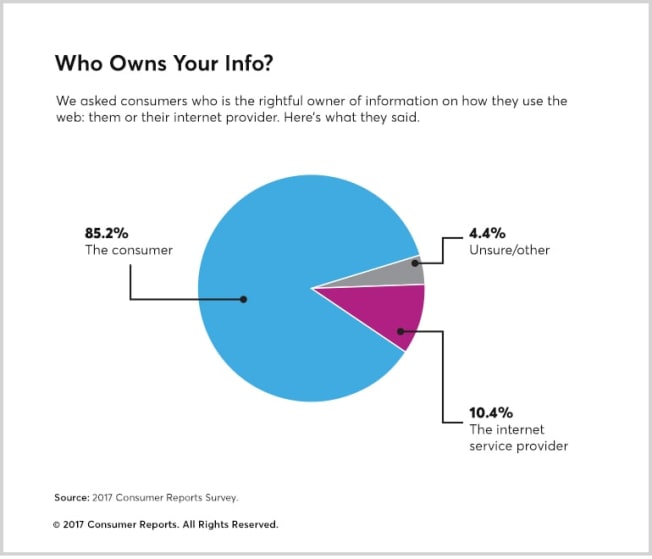Internet Privacy Policies: Who Has a Right to Your Data?
Consumers say they want more power over how their browsing information is collected and used

Consumers who value their privacy can limit what they post on Facebook and adjust settings on sites such as Instagram. But internet service providers (ISPs) have the best vantage point on what consumers do online—and there’s much less you can do about it.
After all, your ISP is the conduit for everything you read, view, or shop for while accessing the web at home.
New rules governing the way ISPs can use consumer data were adopted in 2016 and scheduled to go into effect this December. But they were scuttled by President Trump and Congress this spring. That leaves the future of broadband privacy practices unsettled.
For many consumers, this is a new topic. Here’s what you need to know.
What Consumers Think
Consumers say they want more, not less, regulation of broadband privacy.
In a nationally representative survey of 1,008 Americans conducted in early May for the Consumer Reports National Research Center, 80 percent of respondents told us that ISPs should need to get permission before sharing consumer data. Six out of 10 didn’t think ISPs should be allowed to sell or share this information at all.
We also asked the most fundamental question: Who is the rightful owner of all this data about where we go and what we do online—the consumer or the ISP?
Eighty-five percent of respondents said the data rightfully belongs to them.

consumer reports consumer reports
What the Future Holds
Under the recently defeated rules, broadband providers would have faced a new “opt-in” requirement, forcing them to get permission before using data such as web browsing histories.
Opponents of the rules said it was unfair to hold ISPs to stricter standards than internet companies such as Amazon, Google, and Facebook, which are regulated more loosely.
That argument won the day—and consumer advocates reacted strongly. “Congress wiped out groundbreaking rules intended to empower consumers and protect their privacy,” says Jonathan Schwantes, senior policy counsel for Consumers Union, the policy and mobilization arm of Consumer Reports.
Going forward, state laws could pick up some of the slack. By the end of May, more than a dozen states had proposed some form of legislation tackling the issue. Privacy protection bills were also being discussed in Washington, D.C. But privacy experts don’t expect much from the bills. After all, this is the same Congress that voted to roll back the existing privacy protections.
Do You Read the Privacy Policies on Apps You Download?
Tell us what you do in the comments below.





